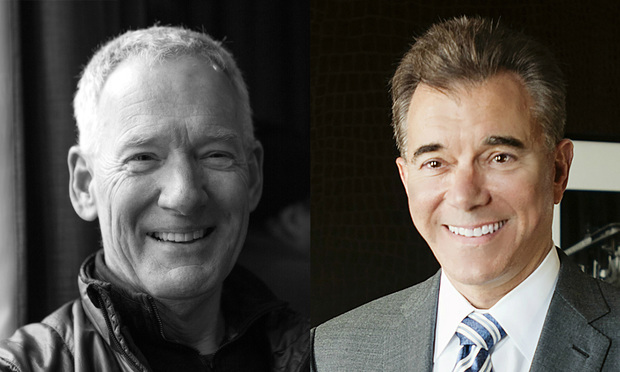Just as Predicted, Lawyers Rush to Protect the Status Quo
Lawyers should lead the charge for reform. Too often it is the opposite—they try to block it.
June 10, 2020 at 06:24 PM
6 minute read
 John Lund, Parsons Behle partner and Ralph Baxter former chairman and CEO of Orrick, Herrington & Sutcliffe. Photo: Courtesy Photo
John Lund, Parsons Behle partner and Ralph Baxter former chairman and CEO of Orrick, Herrington & Sutcliffe. Photo: Courtesy Photo
Two estate planning lawyers, James Gorton and William Winslow, wrote a response to our May 13 op-ed, in which we advocated reform of California's restrictive legal service rules. Their response mischaracterizes the reforms California is considering and exemplifies the kind of self-interested opposition that is being mounted to protect the status quo.
We write today both to address the response and, more importantly, hoping to stimulate public discussion of the access to justice crisis and reforms that will help alleviate that crisis. To date, there has not been nearly enough public discussion of these essential issues.
Addressing Our Access to Justice Crisis
We have a grave problem in our country. The majority of our people, and many of our small businesses, cannot access the legal services they need to deal with their personal and business challenges and ambitions.
Consider that a recent study by the State Bar found that 55% of Californians at all income levels experienced at least one civil legal problem in their household in a given year, yet nearly 70% of them received no legal assistance. Indeed, 85% of Californians received inadequate or no legal help for their problems.
There is no easy solution to this crisis. No one suggests otherwise. California, and several other states, are considering action that can help: reforming antiquated rules that unnecessarily restrict the resources available to serve the underserved. Our op-ed supports such reform.
Smarter Regulation, Not Deregulation
The response claims we advocate "deregulation." We don't. Not even close.
Instead, we propose reexamining and improving our rules so that they serve their purposes better. The way the rules work now impedes innovation and results in consumers not having any legal service at all. What if the building code were so onerous that adequate homes were unavailable to 85% of the population? Would we not all agree that the building code needed fixing? That is the very situation with legal services regulation.
We need to fix these rules. Not eliminate them.
The State Bar of California is considering a proposal that would enable reasonable experimentation and improvement. It would create a "regulatory sandbox" that would permit applicants to propose new models for delivering legal service and demonstrate how they would safely and effectively serve the public. The sandbox model contemplates active regulation of new entities once they are approved, to assure that the public is protected.
We Advocate Increased Protection of Consumers
The response claims "there is not a word" in our op-ed "about protection of consumers." That is false. The truth is protecting consumers, and all others of moderate means, and small businesses, is our main point. It is reflected throughout our op-ed.
Indeed, the response ignores entirely the plight of Californians having no access to legal assistance.
The proposed reforms that would be tested in the regulatory sandbox would provide more options at lower costs for consumers who currently lack any options at all for legal services. In England, similar reforms in recent years led to increased choice and improved services for consumers. It is perverse to prevent consumers from accessing such options in the name of "consumer protection."
The authors argue that the "state bar has a dubious record" of addressing those who take advantage of consumers. But as Jim Sandman, the former president of the Legal Services Corp., pointed out in urging the California Bar to go forward with the sandbox, the alternative for the underserved right now is not an unlicensed paralegal; it is "too often nothing at all." And standing in the way of more and better options "is a classic case of the perfect being the enemy of the good."
The response does not contain any suggestions of how to improve matters for consumers. That is truly revealing. They do not advocate making the system better—they merely advocate leaving it alone. Just as we predicted in our op-ed. The status quo works for the lawyers. The public be damned.
We Need Modern Rules for Modern Times
There is no serious debate that law is far behind other professions in adopting modern technology and processes.
The response suggests that law is indeed modern. It points out that lawyers use tools like Citrix and Zoom (neither of which would be in business without investors). They might as well have mentioned that they use email and voicemail to show how modern they are. The innovation that is required is not just fundamental communication technology. It is technology that advances the way the work is done—technology that automates repetitive tasks, that employs artificial intelligence, that facilitates collaboration among lawyers, other professionals and technology.
For example, a San Diego-based company, Trust and Will, offers consumers the opportunity to generate estate planning documents online, for a fixed and affordable fee. They target millennials who want to be able to get everything done online. A recent national survey indicates that six out of 10 adults do not have any estate planning documents. So this service is filling a need in the market—but they can't even partner with lawyers under the current rules.
Lawyers Should Lead the Charge for Reform
As we said in the op-ed, lawyers should lead the charge for reform. As we also said, too often it is the opposite—they try to block it. In fact, the State Bar is heavily pressured by lawyers seeking to preserve the status quo.
Gorton and WInslow's response vividly illustrates a shortcoming of our current self-regulation of lawyers. Serious people work hard to craft reforms that will serve the public better. Lawyers who benefit from the old rules resist. They suddenly take on the persona of crusaders for the "consumer," not by proposing their own solutions for access to justice, but by alarmist claims that their clients will be harmed if someone else is permitted to offer them an alternative. We can do better.
Ralph Baxter served as chairman and CEO of Orrick, Herrington & Sutcliffe from 1990 to 2013; he is now an adviser to legal technology companies and writes the blog Legal Services Today and co-hosts the podcast Law Technology Now. He has been a member of the California Bar for 45 years. John Lund is a past president of the Utah State Bar, co-chair of the Utah Implementation Task Force on Regulatory Reform, and a partner at the Salt Lake City firm of Parsons Behle & Latimer.
This content has been archived. It is available through our partners, LexisNexis® and Bloomberg Law.
To view this content, please continue to their sites.
Not a Lexis Subscriber?
Subscribe Now
Not a Bloomberg Law Subscriber?
Subscribe Now
NOT FOR REPRINT
© 2025 ALM Global, LLC, All Rights Reserved. Request academic re-use from www.copyright.com. All other uses, submit a request to [email protected]. For more information visit Asset & Logo Licensing.
You Might Like
View All
On The Move: Squire Patton Boggs, Akerman Among Four Firms Adding Atlanta Partners
7 minute read
NBA Players Association Finds Its New GC in Warriors Front Office

Eagles or Chiefs? At These Law Firms, Super Bowl Sunday Gets Complicated
3 minute read
Law Firms Mentioned
Trending Stories
- 1ACC CLO Survey Waves Warning Flags for Boards
- 2States Accuse Trump of Thwarting Court's Funding Restoration Order
- 3Microsoft Becomes Latest Tech Company to Face Claims of Stealing Marketing Commissions From Influencers
- 4Coral Gables Attorney Busted for Stalking Lawyer
- 5Trump's DOJ Delays Releasing Jan. 6 FBI Agents List Under Consent Order
Who Got The Work
J. Brugh Lower of Gibbons has entered an appearance for industrial equipment supplier Devco Corporation in a pending trademark infringement lawsuit. The suit, accusing the defendant of selling knock-off Graco products, was filed Dec. 18 in New Jersey District Court by Rivkin Radler on behalf of Graco Inc. and Graco Minnesota. The case, assigned to U.S. District Judge Zahid N. Quraishi, is 3:24-cv-11294, Graco Inc. et al v. Devco Corporation.
Who Got The Work
Rebecca Maller-Stein and Kent A. Yalowitz of Arnold & Porter Kaye Scholer have entered their appearances for Hanaco Venture Capital and its executives, Lior Prosor and David Frankel, in a pending securities lawsuit. The action, filed on Dec. 24 in New York Southern District Court by Zell, Aron & Co. on behalf of Goldeneye Advisors, accuses the defendants of negligently and fraudulently managing the plaintiff's $1 million investment. The case, assigned to U.S. District Judge Vernon S. Broderick, is 1:24-cv-09918, Goldeneye Advisors, LLC v. Hanaco Venture Capital, Ltd. et al.
Who Got The Work
Attorneys from A&O Shearman has stepped in as defense counsel for Toronto-Dominion Bank and other defendants in a pending securities class action. The suit, filed Dec. 11 in New York Southern District Court by Bleichmar Fonti & Auld, accuses the defendants of concealing the bank's 'pervasive' deficiencies in regards to its compliance with the Bank Secrecy Act and the quality of its anti-money laundering controls. The case, assigned to U.S. District Judge Arun Subramanian, is 1:24-cv-09445, Gonzalez v. The Toronto-Dominion Bank et al.
Who Got The Work
Crown Castle International, a Pennsylvania company providing shared communications infrastructure, has turned to Luke D. Wolf of Gordon Rees Scully Mansukhani to fend off a pending breach-of-contract lawsuit. The court action, filed Nov. 25 in Michigan Eastern District Court by Hooper Hathaway PC on behalf of The Town Residences LLC, accuses Crown Castle of failing to transfer approximately $30,000 in utility payments from T-Mobile in breach of a roof-top lease and assignment agreement. The case, assigned to U.S. District Judge Susan K. Declercq, is 2:24-cv-13131, The Town Residences LLC v. T-Mobile US, Inc. et al.
Who Got The Work
Wilfred P. Coronato and Daniel M. Schwartz of McCarter & English have stepped in as defense counsel to Electrolux Home Products Inc. in a pending product liability lawsuit. The court action, filed Nov. 26 in New York Eastern District Court by Poulos Lopiccolo PC and Nagel Rice LLP on behalf of David Stern, alleges that the defendant's refrigerators’ drawers and shelving repeatedly break and fall apart within months after purchase. The case, assigned to U.S. District Judge Joan M. Azrack, is 2:24-cv-08204, Stern v. Electrolux Home Products, Inc.
Featured Firms
Law Offices of Gary Martin Hays & Associates, P.C.
(470) 294-1674
Law Offices of Mark E. Salomone
(857) 444-6468
Smith & Hassler
(713) 739-1250






